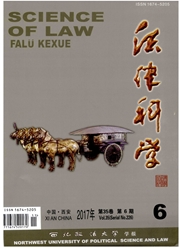

 中文摘要:
中文摘要:
隐私权作为抽象概念有利于保护新兴的隐私利益,但也因其内涵的概括性和外延的不确定性造成司法实践中法律适用的不安定和侵权责任的判定困难。类型化的分析方法具有划定隐私权的保护范围、区分隐私权具体类型、克服其不确定性弊端的功能。以司法案例为基础并厘清其选取范围后,以权利客体为主要标准将隐私权侵权类型分为侵犯私生活安宁、侵犯私生活秘密和侵犯个人一般信息,根据侵权行为、权利主体等要素再进一步划分下位类型,具体分析每一类型的判定基准和侵权责任,以期为立法完善隐私权保护体系奠定基础,为司法裁判隐私权案件提供参考。
 英文摘要:
英文摘要:
As an abstract concept, the right of privacy is conducive to the protection of the emerging private interests, but its generality of connotation and uncertainty of extension results in the instability of the law application and difficult de- termination of tort liability. The method of typologically analysis can decide the protection scope of the right of privacy, dis- tinguish specific types of privacy rights and overcome the uncertainty disadvantage of privacy. On the basis of judicial cases and after making clear of selection range of cases, divide the privacy right into the peace of life, private secret and personal general information based on the object of right. In addition, take tort behavior and subject of right as the standard to fur- ther divide inferior types and analyze the defining principle and tort liability specifically. In this way, it may be helpful for providing the basis of perfecting the privacy protection system in the legislation as well as providing the reference rules for judges to adjudicate cases of privacy right.
 同期刊论文项目
同期刊论文项目
 同项目期刊论文
同项目期刊论文
 期刊信息
期刊信息
